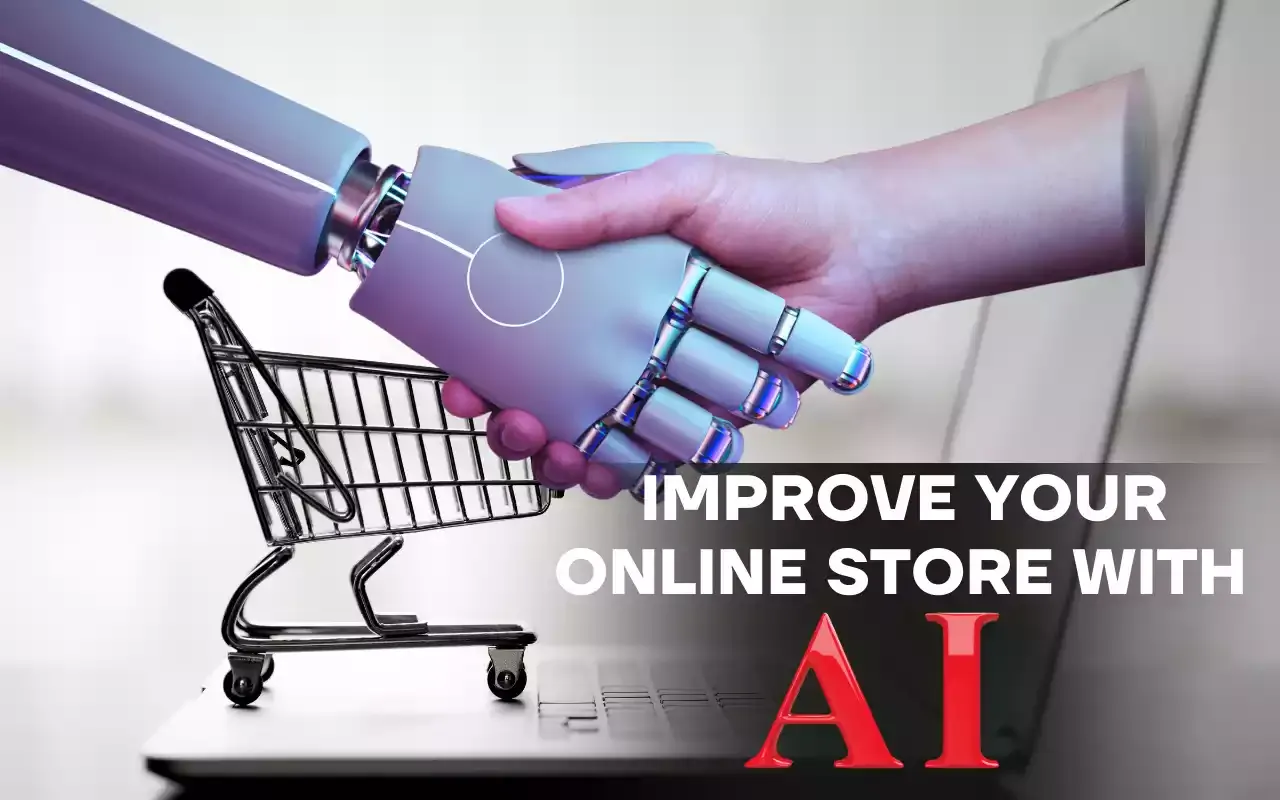Introduction
Many consumers now choose to purchase online since it is more
convenient and frequently less expensive than going to traditional
brick-and-mortar establishments. Online merchants must develop strategies to
differentiate themselves from the competition in order to succeed in this
expanding market. Using artificial intelligence (AI) to enhance the consumer
experience is one approach to do this.
AI may enhance an online store in a variety of ways, including by
personalizing the shopping experience, delivering better customer service, and
boosting sales. Finding the ideal AI solution for your company and properly
implementing it are crucial, though. We'll look at using AI to enhance your
online store in this blog post.
Personalization
The ability to customize products when purchasing online is one of its
main benefits. Online businesses may customize the shopping experience for each
customer by utilizing AI. Offering tailored product recommendations based on
prior purchases, search history, and other consumer information is one example
of this. Customer satisfaction and sales can both greatly improve with a
customized shopping experience.
Personalization Online retailers can provide their clients a personalized shopping experience with the use of AI technology.
➤ Online stores
can employ the following examples of personalization AI solutions:
1. Dynamic Yield is
an AI-powered customization tool that enables the creation of tailored product
suggestions, tailored landing pages, and tailored email campaigns.
2. Evergage:
Evergage is a platform for AI-powered personalization
that can be used to make customized email campaigns, search results, and
product suggestions.
3. Adobe Target:
Personalized product recommendations, personalized
landing pages, and personalized email campaigns may all be made with Adobe
Target AI-powered customization platform.
4. Barilliance:
Barilliance is an AI-powered customization platform
that enables the development of individualized email campaigns, search results,
and product suggestions.
5. Emarsys:
You can make personalized product recommendations,
personalized landing pages, and personalized email campaigns using AI-powered
customization tool.
Customer Service
By giving prompt and correct solutions to consumer enquiries, AI can
also be utilized to enhance customer service. AI-powered chatbots can be
programmed to respond to frequent inquiries and offer efficient answers to
consumer issues round-the-clock. As a result, customer care teams may respond
more quickly and report higher levels of client satisfaction.
➤ Here are a few instances of customer service AI tools that online shops
can use:
1. Chatbots:
Chatbots are artificial intelligence-enabled virtual
assistants that can communicate with clients via messaging services like
Facebook Messenger or live chat on websites. They can process orders, make
product recommendations, and assist consumers with simple questions.
2. Natural Language
Processing (NLP) is an AI technique that can be used to read the meaning of
consumer inquiries. This can help internet retailers respond to customer
enquiries more precisely.
3. IVR, or
interactive voice response, is a phone system that uses artificial intelligence
to answer basic questions and transfer callers to the right department.
4. Email Response
Automation: By delivering automated answers to frequently asked questions,
AI-powered email response automation can assist online retailers in managing
high numbers of consumer requests.
Product Recommendations
The provision of product recommendations is another way AI may enhance
the consumer experience. Customer data can be analyzed by AI-powered algorithms
to recommend goods that customers are likely to find interesting. This helps
buyers find new things that they might not have otherwise found, as well as
increasing sales.
➤ Here are some instances of artificial intelligence programs for product
recommendations that online retailers can use:
1. Amazon
Personalize:
Amazon Personalize is a recommendation engine driven
by AI that employs machine learning techniques to offer users customized
product recommendations. To make useful recommendations, it can examine client
information including purchase history and browsing patterns. An online store's
current platform can be coupled with Amazon Personalize, which is a cloud-based
service.
2. Salesforce
Einstein:
Salesforce Einstein is a platform that uses AI and has
a recommendation engine for products. In order to make customized product
recommendations, it can evaluate client information including browsing and
purchasing patterns. The cloud-based CRM platform from Salesforce includes
Salesforce Einstein.
3. Barilliance:
Barilliance is a machine learning-powered product
recommendation engine that employs user behavior analysis to give tailored
product recommendations. It can be incorporated into the current platform of an
online store and can offer product recommendations, promotions, and discounts.
4. Nosto:
Nosto is an AI-driven platform with a built-in tool
for recommending products. To make tailored product recommendations, it can
examine consumer behavior, including browsing and purchasing patterns. Nosto is
a cloud-based service that may be included into the current platform of an
online business.
5. Dynamic Yield:
Dynamic Yield is an AI-powered platform with a product
recommendation engine. In order to make customized product recommendations, it
can evaluate client information including browsing and purchasing patterns.
Dynamic Yield is a cloud-based service that may be included into the current
platform of an online business. Inventory Control
Inventory Management
Retailers can use AI to identify demand patterns and adjust their
inventory levels as needed. This will help to prevent stockouts and
overstocking, which may be costly for merchants.
➤ Online stores can employ the following examples of AI-powered inventory
management systems:
1. TradeGecko:
An inventory management tool called TradeGecko employs
AI to assist businesses in managing orders, tracking inventory, and predicting
demand. Retailers will always have the appropriate amount of product on hand
thanks to the platform's usage of machine learning algorithms to automate
replenishment and optimize inventory levels.
2. Zoho Inventory:
An online inventory management tool called Zoho
Inventory makes use of AI to assist companies in controlling their inventory
levels and streamlining their supply chains. The technology helps companies
make data-driven decisions regarding inventory levels and reordering by
analyzing previous sales data and forecasting demand using machine learning
algorithms.
3. BoxHero:
Businesses can track inventory levels, handle orders,
and improve their supply chains with the aid of BoxHero, an inventory
management tool that leverages AI. The software can automate the ordering
process and optimize inventory levels based on past sales data. It employs
machine learning algorithms to analyze sales data and estimate demand.
4. Logility:
An AI and machine learning tool called Logility helps
companies monitor their inventory levels, streamline their supply chains, and
boost their overall operational effectiveness. The software forecasts demand
using predictive analytics and can also adjust inventory levels based on sales
information and other variables.
5. Brightpearl:
Using AI, the omnichannel retail management platform
Brightpearl helps companies track orders, manage inventory levels, and improve
their supply chains. The software can automate the ordering process and
optimize inventory levels based on past sales data. It employs machine learning
algorithms to analyze sales data and estimate demand.
Fraud Detection
Online transactions are more secure and legitimate as a result of AI
algorithms' analysis of transaction data and real-time detection of potentially
fraudulent conduct.
➤ The following list of AI tools can assist with fraud detection in
online stores:
1. Sift Science:
Sift Science provides machine learning algorithms that
can identify fraud in real-time, lowering the number of chargebacks and
defending online retailers from fraudsters. The platform uses a combination of
supervised and unsupervised learning algorithms to identify patterns and
anomalies in transaction data.
2. Kount:
Using machine learning to examine transaction data and
spot potential fraudsters, Kount is a fraud detection and prevention system.
The software may be linked with well-known eCommerce systems and provides
real-time transaction monitoring.
3. FraudLabs Pro:
Here machine learning is used by FraudLabs Pro as a
fraud detection tool, to examine transaction data and spot possible fraudsters.
The software may be linked with well-known eCommerce systems and provides
real-time transaction monitoring.
4. Signifyd:
A technology for preventing eCommerce fraud called
Signifyd analyzes transaction data to spot potential fraudsters. The software
may be linked with well-known eCommerce systems and provides real-time
transaction monitoring.
5. FICO Falcon Fraud
Manager:
Using machine learning algorithms to evaluate
transaction data and spot potential fraudsters, FICO Falcon Fraud Manager is a
fraud detection and prevention system. The software may be linked with
well-known eCommerce systems and provides real-time transaction monitoring.
Image Recognition
To help buyers locate what they're looking for, AI can evaluate product
photos and categorize and tag them automatically.
AI image recognition tools can be very helpful for online retailers of visually appealing goods like apparel, accessories, and home furnishings.
➤ Online
stores can employ the following examples of picture recognition AI solutions:
1. Clarifai:
Using Clarifai's AI-powered image and video
recognition engine, product photos may be automatically tagged and categorized.
This can speed up the process of adding products to an online store and enhance
client searchability.
2. ViSenze:
Customers can conduct visual product searches on the
ViSenze platform using visuals rather than text. This can be especially helpful
for online shops that sell unusual or difficult-to-describe products or have a
vast inventory.
3. Slyce:
Slyce is a visual search and product recognition
platform powered by AI that enables users to find and buy things by simply
snapping a picture. Both the customer experience and sales can be enhanced by
this.
4. Cortexica:
An AI-powered image recognition technology called
Cortexica may be used to automatically tag and classify product photographs as
well as find and stop the sale of fake goods..
5. Google Cloud
Vision:
An AI-powered image identification tool called Google
Cloud Vision may be used to automatically tag and classify product photographs
as well as identify objects and faces in pictures.
These are just a few of the numerous picture recognition AI systems
that are offered for use by online retailers. It's critical to take the demands
and objectives of the company into account when choosing an image recognition
AI system, as well as the cost, simplicity of deployment, and potential effects
on the customer experience.
Price Optimization
AI algorithms can analyze pricing data and optimize prices in
real-time, helping online stores stay competitive and maximize revenue.
➤ Here are some examples of price optimization AI solutions for online
stores:
1. Revionics:
Revionics is a price optimization tool that employs
artificial intelligence (AI) and machine learning to offer data-driven insights
on pricing strategies to online businesses. To assist merchants in optimizing
their prices and maximizing their profits, it takes into account a variety of
aspects including market developments, competition pricing, and consumer
behavior.
2. Wiser:
Wiser is a platform for dynamic pricing and
merchandising that uses AI to support businesses in choosing the appropriate
prices for their goods. To help merchants optimize their prices for optimum
profitability, it uses AI-powered algorithms to analyze real-time data from
numerous sources, including rival prices, inventory levels, and market trends.
3. Perfect Price:
In order to help online businesses, optimize their
prices, Perfect Price is an AI-powered pricing optimization software that makes
use of machine learning algorithms. It helps businesses set the best price for
their items by taking into consideration a number of variables like demand,
competition, and inventory levels.
4. Feedvisor:
With the aid of AI and machine learning algorithms, Feedvisor's
pricing and revenue optimization platform helps online retailers increase their
earnings. To assist retailers in determining the appropriate prices for their
items, it uses AI-powered algorithms to analyze real-time data from a variety
of sources, including rival prices, inventory levels, and market trends.
5. Incompetitor:
An AI-powered retail intelligence platform called
Incompetitor gives retailers access to real-time information on the pricing and
marketing tactics of their rivals. Retailers are given data-driven insights to
assist them optimize their rates and boost sales by using AI algorithms to
track competitors' pricing and promotional activity.
Conclusion
Finding the ideal AI solution for your company and properly
implementing it are crucial, though. Retailers can stay competitive and give
their customers a tailored and convenient shopping experience by employing AI.
Overall, AI can help online companies raise revenue, lower costs, and
increase consumer pleasure. It's crucial to remember that integrating AI
involves thorough thought and consideration to guarantee that it is
successfully incorporated into the business and is in line with the company's
objectives and values.



Post a Comment